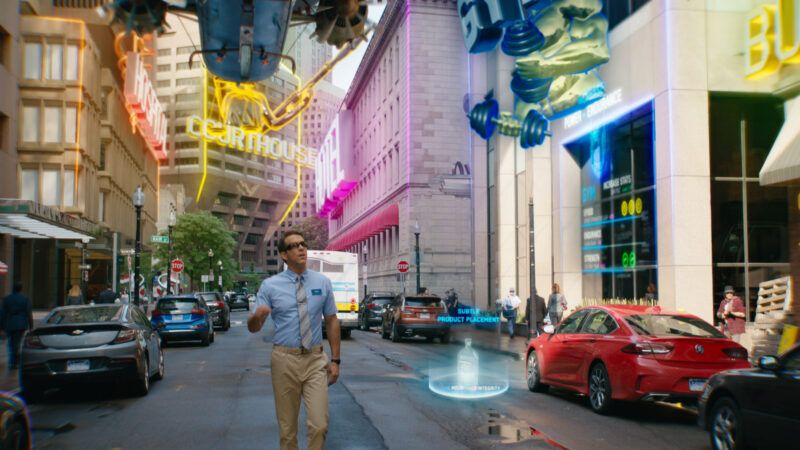With Free Guy, Hollywood Gives Us a Video Game Movie About the Thrills of, Uh, Labor Disputes
Ryan Reynolds stars as a video game character who discovers his whole life is a lie.

Finally, a video game movie that elevates the exciting issues: labor disputes.
Free Guy is nominally a movie about Guy (Ryan Reynolds), a non-playable video game character, or NPC, finding his humanity after a life of undifferentiated boredom—and then bringing that humanity to his fellow NPCs. Freedom! Self-actualization! Sure.
But mostly it's a smugly calculated exercise in corporate synergy dressed up as a feel-good story of revolutionary class politics. Not only does it resolve in a rah-rah job action by a virtual city full of NPCs, but its secondary conflict revolves almost entirely around an intellectual property rights dispute between a pair of nerdy indie game designers and the self-important, villainous boss of a major violent video game company. Will they get their residuals for their stupid nonviolent watch-the-waterfalls game? I promise it's even less thrilling than it sounds.
The movie isn't subtle about any of this. As the put-upon NPCs gather in their virtual world to listen to one of those get-us-into-the-third-act rallying cry speeches that screenwriting books always insist on, a programmer watching in the real world footnotes what's happening just in case viewers somehow didn't catch on themselves.
"It's like every NPC went on strike," he says, before belaboring the point even further by exclaiming: "It's like a digital walkout!" Paying members of the audience may be tempted to stage their own walkout in the physical world.
The movie's shallow labor politics are intended to give this crass, calculating film the illusion of depth. But as with so many virtual worlds, when you look closely, there's nothing remotely real to be found. Instead, the movie is a collection of painfully formulaic screenwriter conventions dressed up with some nods to video game culture and conventions—city streets filled with people randomly hopping up and down or glitching in and out of visibility as they repeatedly run into walls. Someone has clearly done deep research for this film, and by "deep research" I mean played at least an hour each of Grand Theft Auto V and Fortnite.
There's very little original to be found in this movie, which is basically a mash-up of Wreck-It Ralph and The Truman Show. Guy is a man in a fishbowl, which the movie oh-so-cleverly signals by having him wake up every day and talk to a goldfish. (See, it's, like, a metaphor, man. Yep. Got it.) Guy breaks out of the ho-hum monotony of his life, and discovers that his pain and suffering have been exploited for the entertainment of others. In the end, he breaks free of his little, confined world, traveling past a barrier at the ocean's edge, becoming a global object of fascination, just like Truman but without the part where it ever becomes an interesting or thoughtful movie.
Indeed, Free Guy is more concerned with wink-wink cameos and smothering viewers with corporate synergy than anything else: The film features so many hey-can-you-believe-it's-that-guy moments that preview screenings began with a pre-taped Ryan Reynolds spiel begging early viewers not to spoil the big reveals. But there's nothing to spoil, because none of the cameos have any real relevance or meaning beyond nodding to other properties you're probably already aware of.
For a movie that tries to rail against exploitation, this movie has plenty of it, in the form of intellectual property—or, in Hollywood parlance, IP—deployment. There's something deeply sad about this sort of relentlessly empty referentiality, which adds nothing except a vague sense of familiarity. Hey, each passing gag seems to say, you've seen this other movie (or played this other video game) too! Congratulations on having consumed these other products. Likes and retweets all around. This is a movie for the type of people who love movie trailer recap videos. It's two hours of hunting for worthless IP Easter eggs in a void.
There is nothing wrong with IP development, Hollywood synergies, endless franchises, reboots, sequels, or even Ryan Reynolds, who gave us a pretty good gin company and is often genuinely charming, despite being Canadian. I, for example, am a mostly happy participant in the Marvel Cinematic Universe's just-wait-until-the-next-one school of serialized filmmaking, though I reserve the right to grumble loudly about it as well. But those franchises work best when they offer something like real conflict to chew on, or at least well-defined characters with recognizable personalities to root for.
Free Guy, in contrast, gives us a Ryan Reynolds protagonist so blank he's known to most of the world as "blue shirt guy." His main personality trait is liking ice cream, presumably so that everyone who isn't lactose intolerant can relate. I'd say he's as vacuous and empty as a video game character, but I've killed mushroom-shaped 8-bit minions with more distinctive personalities than this.
At the end of the movie, the same programmer who narrates the NPC strike speech also attempts to justify the movie's existence. "Who," he wonders, "would have thought so many people would want to watch video game characters instead of shoot at them?" When the virtual characters are this thin and this annoying, I think I'd rather power up a Legendary weapon and take digital aim.


Show Comments (48)